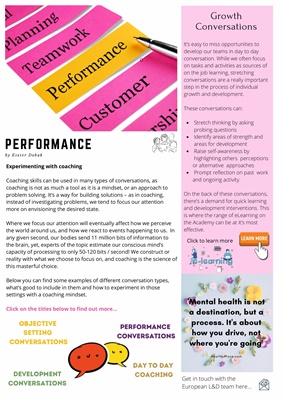
PERFORMANCE
b y E s z t e r D o b a k
Experimenting with coaching
Coaching skills can be used in many types of conversations, as
coaching is not as much a tool as it is a mindset, or an approach to
problem solving. It's a way for building solutions - as in coaching,
instead of investigating problems, we tend to focus our attention
more on envisioning the desired state.
Where we focus our attention will eventually affect how we perceive
the world around us, and how we react to events happening to us. In
any given second, our bodies send 11 million bits of information to
the brain, yet, experts of the topic estimate our conscious mind's
capacity of processing to only 50-120 bits / second! We construct or
reality with what we choose to focus on, and coaching is the science of
this masterful choice.
Below you can find some examples of different conversation types,
what's good to include in them and how to experiment in those
settings with a coaching mindset.
Click on the titles below to find out more...
Stretch thinking by asking
probing questions
Identify areas of strength and
areas for development
Raise self-awareness by
highlighting others perceptions
or alternative approaches
Prompt reflection on past work
and ongoing activity.
It's easy to miss opportunities to
develop our teams in day to day
conversation. While we often focus
on tasks and activities as sources of
on the job learning, stretching
conversations are a really important
step in the process of individual
growth and development.
These conversations can:
On the back of these conversations,
there's a demand for quick learning
and development interventions. This
is where the range of eLearning on
the Academy can be at it's most
effective.
HealthyPlace.com
'Mental health is not
a destination, but a
process. It's about
how you drive, not
where you're going'
Growth
Conversations
o
Get in touch with the
European L&D team here...
Click to learn more
Objective
setting
conversations
development
conversations
Performance
conversations
day to day
coaching